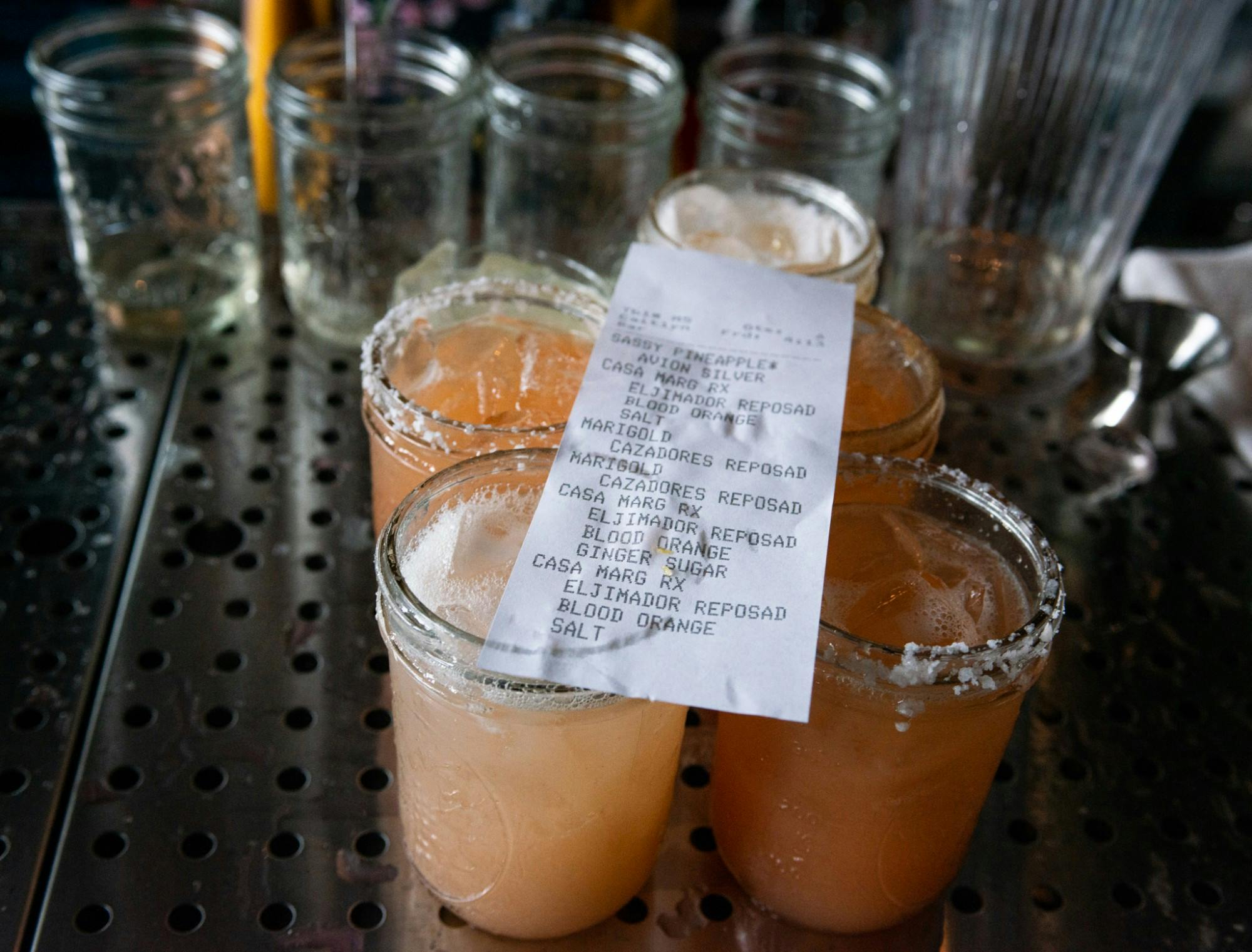When the clock strikes 5 p.m. on a Friday night, masses of Michigan State University students and locals alike have one destination in mind: the bar.
Customers enthusiastically join a line that trails down the street, sometimes waiting 30 minutes to make it inside their favorite bar. Once inside, they might spend another 20 minutes waiting for a drink inside the packed room, anxiously tapping their card on the counter to catch the bartender’s attention.
But an entirely different world exists for those of us who stand on the other side of the bar top.
For service workers like me, these nights are how rent is made, how tuition gets paid and how we make a comfortable living in an otherwise unstable line of work.
The job is not without its difficulties. Fluctuating pay, countless instances of harassment and disrespect – these are the sacrifices that I, and the fellow industry members interviewed by The State News, decide are worth making.
But another difficulty now plagues service workers in Michigan – a blow that employees, for once, have decided is not another bullet on the industry’s list of downsides that we can bear.

Legislation changes could change restaurants as we know them
Barring any action, a measure that removes Michigan’s tip credit will go into effect in February 2023.
This change was introduced as a part of a 2018 ballot measure that sought to raise Michigan’s minimum wage.
The tip credit allows employers to pay tipped employees a lesser wage than the state’s minimum - $3.75 per hour. Tips left by customers compensate for this low wage.
John Sellek, spokesperson for the 501c3 Save Michigan Restaurants, said this change will impose an “economic storm” upon Michigan’s “already reeling” restaurant industry – including higher menu prices to compensate for the higher wage payout, loss of tips resulting in lower incomes for tipped employees and closure for many businesses.
“These workers fear this system being obliterated,” Sellek said. “It's going to not only upset their way of life, it's going to end their ability to work in this industry, because they're just not going to get paid what they're getting paid today.”
Surviving vs. thriving off tips
The understanding that employees survive off tips leads to a certain degree of customer sympathy, and overall, more frequent tipping.
Patrons now accept tipping as the essential cost for great service, which in turn allows workers to not just merely survive but create a comfortable lifestyle.
Carnegie Mellon University adjunct professor Lloyd Corder surveyed 336 restaurant employees who earn tips to understand how industry workers would feel about the removal of Michigan’s tip credit. Of those, 99 percent said they currently make more than the state’s minimum wage of $9.87.
Seventy-five percent of these workers believe tipped workers will make less money without the tip credit. Customers would still have the option to tip, but 49% of respondents said customers would stop completely.
“As soon as people figure out that they're not getting low paid, and they don't have to take care of them, that tipping is going to drastically be reduced or eliminated,” Sellek said.
Support student media! Please consider donating to The State News and help fund the future of journalism.
MSU alum and The Riviera Cafe bartender Gabbie Huhn has been in the industry since she was 14. She earns between $30 and $40 per hour bartending. The flexible gig has allowed her to support herself through college and more easily meet her graduate school application requirements.
Huhn said she doesn’t have a single coworker who would do the job she does for a regular hourly wage. The job is difficult, she said, working "awful" hours, often past 2 a.m. The money, however, is what makes it all worth it.
Without tipping, Huhn said the experience customers receive inside restaurants would not be the same. She said removing the incentive of a tip would result in worse service.
“You're kind of like your own little entrepreneur,” Huhn said. “The incentive is, the more that I make the experience for the customer, the harder I work, the faster I work, the more money I will make, so you've really had this control over your job.”
Quite frankly, Huhn said, she and most of her coworkers would quit if they made less tips – it's too exhausting of a job to do for less money.

Service jobs as a career choice, not a fallback
Tammy UpChurch, a Buffalo Wild Wings server, has been serving for 35 years. She is what the industry calls a lifer, having successfully built a career out of serving. Thanks to tips, service jobs have more frequently become a sound career option for those with a passion for the hustle of hospitality.
Flexibility is a large benefit, UpChurch said, but having cash in hand every day is what keeps everybody in the industry. She said she can make up to $50 an hour as a result of her hard work.
“You learn to communicate, you build regular people," UpChurch said. "I have so many regulars it's crazy. But if that was to go away, it would literally destroy restaurants, as well as the people that work in them.
International relations senior Zack Cisco works at a family-owned bar in Illinois between semesters at MSU. Since entering the industry, he’s begun to understand bartending and serving as a viable career option for some people, rather than a temporary gig.
“With all the stigma and stereotypes, I've never really seen that as a long-term profession where you're gonna spend the rest of your life doing this and make a decent income,” Cisco said. “But working with these people who have been doing it for 30 years and seeing the kinds of life they live … they aren't necessarily struggling.”
What isn’t in the job description
Working in the industry, despite the monetary benefits, comes with a long list of drawbacks.
To people who might question why she deserves the income she makes with tips, Huhn describes making unique sacrifices.
“I'm giving up football games, I’m giving up all of these things to sling drinks for hours and hours … and deal with drunk people,” Huhn said. “All of these things that you're not giving up, I am giving up.”
Kinesiology junior Francesca Vitale bartends at a corporate-owned restaurant in Okemos. She's been in the industry since she was 16. Though she says the positives outweigh the negatives, her mental health sometimes takes a toll due to her job.
“It's hard sometimes, working with the public and being on your feet and missing out on occasions because you never work normal hours in the service industry,” Vitale said. “Work is very mentally draining for me most days.”
On top of the everyday tasks that keep a restaurant or bar running smoothly, Vitale said there are more responsibilities that come with the job – responsibilities that are necessary to making a decent income through tips.
“You're not just there to serve people,” Vitale said. “You have to listen to them talk. You have to be their therapist. You have to be their voice of reason. If you're having a bad day, you're not allowed to have a bad day at work.”
Despite the hardships, servers and bartenders like Vitale, Huhn and UpChurch find a sense of belonging and value in the ever-changing industry.
Perhaps the only problem that remains is getting others to acknowledge the value of our work and decide it’s worth the continuation of a tip system that workers have navigated and successfully utilized for years.
“Being a tipped employee is everything to me … People choose the industry,” UpChurch said. “It doesn’t choose you.”



